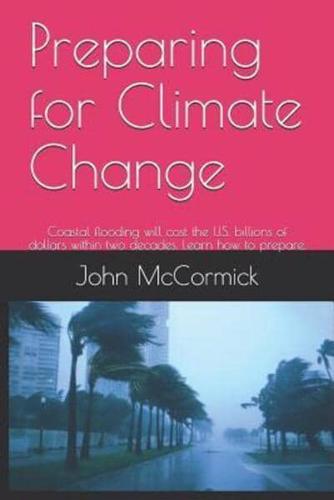Publisher's Synopsis
There are 300,000 coastal U.S. properties which, if purchased today with a 30-year mortgage, will be worthless by the end of the mortgage and by 2099 will cost the United States more than $1 trillion of lost property value. The complete situation including bank failures and infrastructure destruction will be much worse.This booklet is about how you and your community can prepare for climate change.You'll find the latest measurements and estimates to help families, investors, and government officials prepare for the inevitable.Whether you believe the earth is warming because of human action or not, this booklet is still for you.Whatever the cause, whatever you believe, everyone can see: Summers are getting hotterStorms are getting worse and more frequent.Floods are getting worse.The growing seasons are changing.Glaciers are melting.And the sea is rising - records go back for centuries.This booklet is NOT an argument about what causes climate change. This is also NOT about whether or how we can combat climate change. It is almost certainly too late to make any useful changes and the climate will continue to change for at least the next 50 to 100 years with consequences stretching into the next millennium.One of the biggest changes will come when people realize many coastal properties are about to become worthless. That will destroy family finances but also bring down banks which hold mortgages and the entire real estate business.This already happened in New Orleans. It is just beginning to happen in parts of Florida and coastal Maryland, but banks are still writing mortgages and insurance companies are writing policies on seaside mansions which climate science says will soon be underwater.A Union of Concerned Scientists study shows that by the end of this century at least 2,500,000 U.S. properties (homes, schools, churches, businesses, public buildings, roads, airports, and ports) will experience periodic flooding. It is supported by studies and reports published by The National Academies of Science and Technology.Sea level rise is not a theory; it is something that is easily measured.The only thing I will say about the climate change debate is that, yes, it is true that more than a thousand engineers and scientists have signed on to the position that climate change isn't really going to be as bad as predicted. But the important point is that NONE of them are climate scientists. I wouldn't trust a climate scientist to design a bridge, so why would I believe a civil engineer's opinion about climate change?Would you go to a chiropractor for a broken leg? A medical doctor for financial advice?Climate change is occurring; just look around at the increasing heat in some places and worsening storms almost everywhere. If it isn't flooding, then it is probably a drought.This year (2019) farmers in the Midwest breadbasket of the United States had to delay planting by two months and if the rains had kept up another two weeks many would have lost their crop insurance and couldn't plant at all.Next year might be better.Then again, next year the rain might also last two weeks longer.Climate change isn't predictable on a small or local scale. Weather is predictable a few days out; climate change is about the average of what will happen over the next decade or century.In fact, because it is the only worldwide effect, sea level change is the only part of climate change that can be accurately predicted.Whether you don't believe it is happening at all, or you think it won't be as bad as predicted by most scientists, are you really not going to plan for the possible/likely/certain changes
























